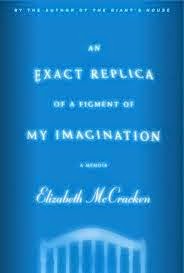Jackson, Shirley. Life Among the Savages. New York: Farrar, Straus and Young. 1948. Print
First Sentences:
Our house is old, and noisy, and full.
When we moved into it we had two children and about five thousand books; I expect that when we finally overflow and move out again we will have perhaps twenty children and easily half a million books....
I cannot think of a preferable way of life, except one without children....
Description:
Shirley Jackson is best known for her creepy short story, "The Lottery" with its surprise, horrifying ending. But in a completely different vein is her humorous memoir of her family adventures in their everyday world, Life Among the Savages, which details her life with husband and children in rural New Hampshire.
After getting a notice of eviction from their New York City apartment due to the forgotten end date of their lease, Jackson, husband, and two children knew they had to look for a larger place outside the city. But they delayed their search out of procrastination until just days before being kicked out of their apartment. Then they remembered friends who had successfully re-located to a small town in New Hampshire. So Jackson's family finally started (and ended) their house search there.
The house hunt is the first adventure she relates. An agent in the rural town shows them only places to buy (despite their protestations that the Jacksons wanted to rent a normal house). All had no plumbing, were falling down or without heat, often all the above.
Once settled, Jackson gives us stories of their highly-personable children, starting with son Laurie's first day of school:
The day Laurie started kindergarten he renounced corduroy overalls with bibs and began wearing blue jeans with a belt; ...an era of my life was ended, my sweet-voiced nursery-school tot replaced by a long-trousered, swaggering character who forgot to stop at the corner and wave goodbye to me.
Laurie came home with lots of stories in the first weeks of school, all involving a fellow student named Charles, who did one bad thing after another and was punished by their teacher. Biting, saying nasty words, and throwing chalk, Charles became a fascinating character in the Jackson family's life. Jackson herself was incredibly curious to meet Charles' mother and see what kind of woman could raise such a mischievous boy. Then came the first parent-teacher night when she found out from Laurie's teacher that Laurie had taken some time to adjust to school ... and that there was no Charles in the class.
Jackson's imaginative daughter Jannie gets her share of coverage.
Daughter Jannie (age 5) went by Mrs. Ellenoy, "the second Mrs. Ellenoy," because the first had died and left her with 7 daughters all named Martha.
Jackson's husband, usually a quiet figure in the family adventures, was the central figure of a wonderful story involving his air gun (bought for "target practice"), their pet cat, a chipmunk, and a bat that all came together inside the house.
Other delightful tales included:
- When the family thinks about buying a car (their first since no one knew how to drive) and the ensuing arguments about who would get to sit in the front passenger seat. Of course, after they finally do get a car, son Laurie decides he'd rather have a plane, and the fights renew over who would get to sit on the wing.
- When Father and son bond over coin collecting, but are dismayed to find one shipment that contains both a bag of valuable coins as well as a bag of counterfeit coins. The bags had burst, accidently scattering the real and fake coins together to be somehow sorted over the weeks to come.
Life Among the Savages is just a lovely, clever, funny, and completely believable accounting of a normal family living an everyday life in a small town. Absolutely delightful in all ways, a welcome antidote to our grouchy, pandemic-stay-at-home blues.
____________________
If this book interests you, be sure to check out:
Gilbreth, Franklin B. Cheaper by the Dozen.
Memoirs of a family with twelve, yes that's 12, children, iled by the quirky father, a famous time-management expert who tries to regulate the learning and activities of the household. Don't need to say any more except that it is cleverly written and extremely funny, full of wonderful stories.












